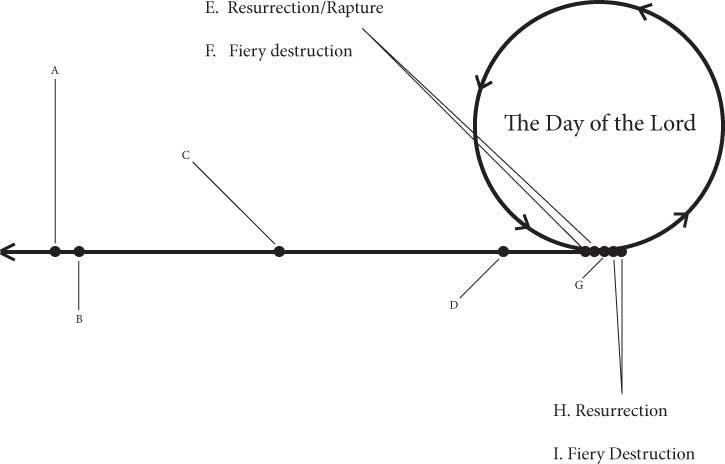(This is Part 3 in a series.)
Part 1 in “Day of the Lord: A Strategic Perspective”
Part 2 in “Day of the Lord: A Strategic Perspective”
I do not write these things for anything we might do to prepare for the end of this world. I do it to further explain how certain events at the beginning and end of the Millennial era are so similar that most are not able to disambiguate them, which could prevent some from preparing for the time of great trouble that comes before the Millennial era. With a resurrection and a fiery destruction occurring just before the Millennial reign, and another resurrection and fiery destruction occurring not long after, it is easy to misunderstand what sorts of troubles go where and for how long and against whom. To adequately prepare for the great tribulation, which I do wish to work on, we need to understand the timing and duration of the troubles that do belong on this side of the Millennial kingdom, which are more than enough without adding the troubles that belong after it.
The nature of man cannot change, but the nurture of man can and will change dramatically. What we can look forward to regarding life for survivors in the early years of the Millennial kingdom will greatly help us overlook our current and prospective struggles between now and then. Having something to look forward to, having a goal or a milestone of achievement can do more for one’s survival than all the knowledge, tools, and survival skills under the sun.
The longer we continue muddling up the events that occur around the time of the Millennial era, because there are so many events occurring in a relatively short amount of time, the more distracted we become from focusing on the wonderful years that belong to humanity under the nurturing leadership of Christ. I wonder what sort of accomplishments might be possible when humanity is not beset by the deadly sins for the entire space of a thousand years. If focusing on those years requires a more active use of the imagination, then I must reiterate a certain quote by Albert Einstein, basically saying that “Imagination is more important than knowledge…”
A careful examination of the typical discourse on the subject of the last days will not reveal to you much real understanding, so much as it will resemble an academic debate where the contestants seem to think they are competing for a prize. What we know or think we know about events yet to come pales in comparison to what we can do to help others endure and survive the great tribulation. The call to ‘understand’ certain prophetic scriptures (Matthew 24:15), is not so that one could become a member of a last-days debate club, so much as it is a call to combine in a joint venture with the Lord (Psalm 127:1 and Isaiah 41:20), in the establishment of a place of security, (Proverbs 24:3,4), first for Israel and then for potential survivors in places all around the world.
It was said by one of the disciples that the world itself could not contain the books that should be written about Jesus’ life and ministry. With that being the case, then I think we would be able to take a little poetic license and begin trying to imagine and gain a head start writing the books that pertain to the positive impact that his presence will have on humanity during the 1,000 year reign.
In the following outline for what might be called the drama of The Last Day, there are many aspects which we could pursue and combine to develop an in-depth discussion. Most of these are covered ad nauseum, to the point that the waters are muddied and the pastures are trodden down. Where there exists pristine grassland practically untouched by foot of man would align with the aspects mentioned above, in essence the blessed life that belongs to men, women, and children in the glorious time that transcends the troubles that we typically dwell upon around the time of the end.
Summary of the Dramatic Elements in The Last Day
Backstory–
Around the time of Armageddon, the nations had become suicidal. They wanted to destroy themselves and all living things. Life had become too depressing, too painful, and too dark for general society, by which is meant the society of those who had chosen to bow in worship to a man and then take his mark in their right hand or forehead.
The cost of not bowing was death. A portion of humanity remained alive and retained their integrity by attempting to survive off-grid in the deserts and wild places of the earth. It wasn’t easy, but some did it.
The power to destroy all living things had fallen into the hands of a doomed society. The leaders of that society controlled the weapons capable of destroying the planet several times over. But there was one thing capable of distracting them from unleashing those weapons: to see the Son of Man returning in the clouds of heaven.
Their fear of his wrath suddenly overcame their newfound hatred of life, and they became a bit too freaked out to follow through on their suicidal tendencies. What portion of these people survived the great earthquake and great hail of plague seven, which followed close on the heels of his arrival, they were burned alive by a fiery destruction that proceeded forth from the Lord. Both the living and the dead were turned to ash, thus sparing the remnant of humanity the burden of burying so many bodies.
With the announcement of Christ’s arrival, being the sounding of a trumpet or the voice of an archangel, those who had been beheaded for their faith because they would not bow in worship to the man, they were resurrected to meet Him in the air. Immediately following that resurrection, those survivors who had believed in Jesus before his return and were looking for it, they too were raised up to receive immortality.
That basically left only one group of people left on earth: they were the survivors who did not believe in the identity of the Messiah before seeing Him with their own eyes. Owing to their lack of faith they did not receive immortality; however, they did receive mercy and a certain level of divine protection from plague seven because they knew better than to bow in worship to a man and knew better than to take his mark. Despite the temptations to return to society and partake of the creature comforts that went along with compliance, they chose to keep their spiritual integrity, and for that reason they earned the right and the privilege of becoming the founding members of humanity in the generation of the Millennial era.
To live a prosperous life during a time of tremendous peace on earth and goodwill towards men, the only expectation that the Lord placed upon these survivors was that they would come to Jerusalem once a year to celebrate the feast of tabernacles, in honor of the Lord for sparing them in their ordeal of surviving in the wilderness through the great tribulation.
In the earlier years they wholeheartedly worked together to rebuild the infrastructures necessary to make this annual pilgrimage to the Holy land. Plague seven had done tremendous damage but the amount of resources they had to work with was practically limitless, the only limits to their progress being their own imaginations.
The years passed and they prospered and grew mighty in strength and numbers, always at peace with their fellow men and always doing what was in the interest of others as much as for themselves. Life in the Millennial era was incredibly nurturing.
Conflict–
Then the 1,000th feast came and something changed. It was a great feast all in all, but it was such a milestone and such an incredible gathering that anything afterwards would seem anti-climactic. Plus, the Devil who had been in chains for the entire 1000 years and was unable to directly tempt the nations during that time, he now had access to sneak into that ever present shadow in men’s hearts and tempt them to question the one rule that guaranteed their prosperity.
Rising Action–
As the serpent tempted Eve in the Garden of Eden to eat of the forbidden fruit, so he tempted some nation(s) to refuse to go any more to the feast of tabernacles. The cost of not going was drought, and drought became the curse that led to strife and contention, which would lead the nations into discord and ruin yet again.
Climax–
When that strife and discord reached a fevered pitch, the seven trumpets began to sound, giving the members of humanity repeated opportunities to repent and return to the Lord. For the most part they did not.
Falling Action–
And by the time it came to the last three trumpets, things had become very desperate for the mortals. The divide between mortals and immortals grew vast, quite a difference from the gloriously wonderful thousand years when there had been so much comingling between the two camps.
Resolution–
With the sounding of the seventh trumpet, the final trumpet, the last day arrives and the souls of all who had passed from the beginning of time are raised up to Judgment, the righteous to eternal life and the wicked to condemnation. The heavens and the earth, along with all elements in this universe are consumed by flame, making way for a new heaven and a new earth.
The End—

The points on this timeline are representative of just some of the prophetic events to unfold around the time of the end.
Standing where we are on the linear timeline, it is somewhat difficult to keep some of these points from overlapping, and it is especially difficult to see which may come before the Millennial kingdom and which may come later. It all happens around the time of the end, so the tendency is to lump them together.
There are relatively few scriptures to describe life in the Millennial era, so it is easy for us to overlook the importance and the value of that. It is time to change how we look at the time of the end.







